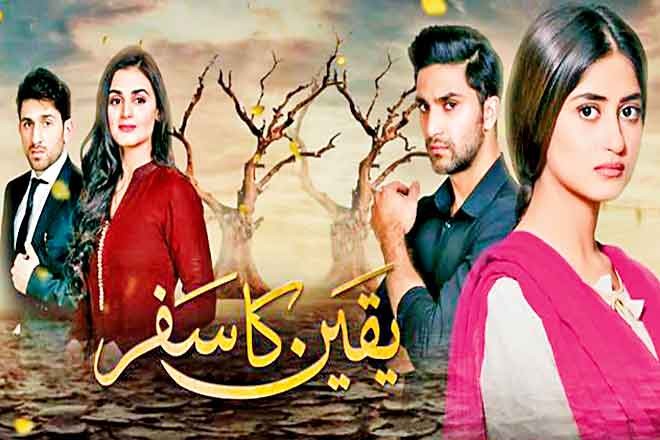

TV talk
Most Pakistani TV plays are struggling to break free from a dark place where weak narratives and poor character development reigns supreme. On one end there are plays that focus on love affairs and family disputes while on the other, there are those that attempt to break away from domestic dramas and bring social issues or some rare, interesting ideas to the fore. What we’ve noticed is that most of them fail to retain the consistency or strength with which they take off. Another common element in most plays is the killing off of characters; it seems that the best way to give closure to a character or a storyline is to kill the character off.
If we take a closer look at some of the popular TV plays that appeared on television in recent past as well as those that are currently on air, it is a common observation that there is no better end or climax to a story than killing off a character. Remember Mann Mayal? Jeena or Mikail were both dispensable characters and with no better end in sight and so one committed suicide while the other was murdered by loan sharks. Similarly, Mahi (Ayesha Khan) in Khuda Mera Bhi Hai is unnecessarily knocked off at the end.
Sammi that concluded earlier this year and starred Mawra Hocane, Ahad Raza Mir, Adnan Sididqui, Sania Saeed and Bilal Khan in pivotal roles, also suffered at the hands of several unnecessary deaths. The character of Salaar, essayed by Ahad Raza Mir, was killed at a time when we expected him to take a stand for Sammi (Mawra Hocane) and fight for her. Had he not died, the story may have emerged to be more interesting with Salaar returning to his roots in Rahim Yar Khan where his mother (Sania Saeed) belonged. Left with no purpose in life, she is killed off too.
Moving on, the recently concluded drama serial, Yakeen Ka Safar starring Sajal Aly, Ahad Raza Mir, Hira Mani and Shaz Khan in prominent roles also killed not one or two but three characters that shaped up the narrative; death was an integral part of the story but to be fair, two of these deaths were important for story development. Sajal Aly’s mother dies at the hands of her husband, which creates the premise of the story. Then Shaz Khan, who essays the role of a barrister, dies fighting for justice.
Finally, Sajal’s father, played by actor-director Mohammed Ehteshamuddin, also loses his life as the story requires her to move to another city where she is destined to meet Ahad Raza Mir.
Next in line is Alif Allah Aur Insaan that is currently on air and features Mikaal Zulfiqar, Kubra Khan and Shahzad Sheikh in lead roles. Khan unwillingly marries Zulfiqar and seeks divorce soon after to tie the knot with Sheikh whom she is in love with. Upon learning this, Khan’s father (essayed by Usman Peerzada) kills Sheikh’s parents who weren’t at fault. It’s almost as if there is no better end for them in the play and they are no longer needed; hence, they are killed.
These are just a few examples where we have witnessed unnecessary deaths, written into the narrative when a character becomes useless and there’s isn’t a better way to give him/her closure. It’s lazy story-telling because seriously, sometimes one needs to see a character suffer for his sins (as in Mikael from Mann Mayal) and death isn’t accountability enough; it looks like an easy way out. At times this may work in favour of the plot but most of the times it makes no sense at all.